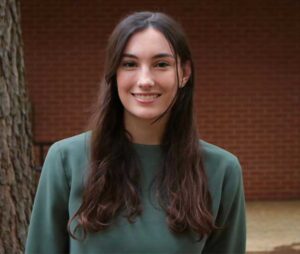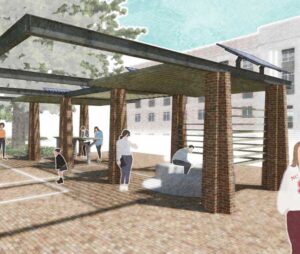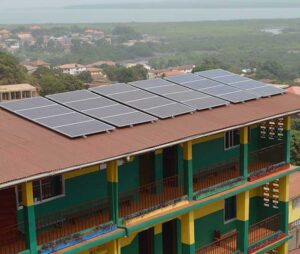Women’s History Month: Powering a Clean Energy Future for All
STUDENTS SHAPING THE FUTURE
 “Diverse perspectives are really key in driving those more innovative and inclusive solutions during the clean energy transition,” said Martina Gonzalez Bertello, a senior at North Carolina State University (NC State) and President of the Student Energy Club. The NC Clean Energy Technology Center (NCCETC) sat down with Bertello for Women’s History Month to find out what drove her towards clean energy and the projects she has on the horizon.
“Diverse perspectives are really key in driving those more innovative and inclusive solutions during the clean energy transition,” said Martina Gonzalez Bertello, a senior at North Carolina State University (NC State) and President of the Student Energy Club. The NC Clean Energy Technology Center (NCCETC) sat down with Bertello for Women’s History Month to find out what drove her towards clean energy and the projects she has on the horizon.
In 2019, the Student Energy Club hosted its first all-women panel called “Power Shift: The Future of Energy and the Women Shaping It.” The panel discussion emphasized the importance of interdisciplinary communication and finding balance in systems when mapping the future of energy. Last year, Martina and the Student Energy Club worked with the NCCETC and other campus partners to coordinate NC State’s inaugural Energy Week, a week of virtual events to increase visibility of the university’s energy use, research and opportunity to shape a clean energy future.
“My fascination with scientific innovation combined with an awareness of climate change really led to my passion for sustainability,” Bertello explained. “My goal in mind was to make clean energy more accessible for students on campus.”
 As student coordinator of the NC State Stewards, Bertello has helped transition campus towards a brighter, more sustainable future. Next month, the Stewards are planning to break ground on SolarSpace at Gardner Arboretum. Using a trellis already in the space, the Stewards plan to place four refurbished solar panels donated by SolarPack to provide 800 Megawatts for charging cell phones, laptops and other electronics for students and members of the community.
As student coordinator of the NC State Stewards, Bertello has helped transition campus towards a brighter, more sustainable future. Next month, the Stewards are planning to break ground on SolarSpace at Gardner Arboretum. Using a trellis already in the space, the Stewards plan to place four refurbished solar panels donated by SolarPack to provide 800 Megawatts for charging cell phones, laptops and other electronics for students and members of the community.
Emma Wilson, another Steward studying fisheries, wildlife and conservation biology, is leading a project to transform an existing terrace at NC State’s Talley Student Union. The Stewards identified an opportunity to add solar power to the space since it currently has no outlets for students to use.
“We want to showcase multiple faces of sustainability acting in unison,” Bertello noted, “Individuals visiting Talley would have the opportunity to learn about solar energy, green infrastructure and much more.”
After she graduates this spring, Bertello will be attending The University of North Carolina at Chapel Hill to get her Master’s of Science in Environmental Engineering. Bertello also plans to support their newly-created Carolina Sustainability Council which launched late last year.
PROFESSIONALS POWERING THE PRESENT
 Marie Spokas graduated from NC State in May 2020. Now, Spokas is an electrical engineer for Power Secure, a company that delivers sustainable and resilient energy solutions that drive growth and prosperity through industry-leading innovation and a commitment to a net-zero future.
Marie Spokas graduated from NC State in May 2020. Now, Spokas is an electrical engineer for Power Secure, a company that delivers sustainable and resilient energy solutions that drive growth and prosperity through industry-leading innovation and a commitment to a net-zero future.
 During her time as a member of the NC State chapter of Engineers Without Borders, Spokas traveled to Sierra Leone to install a 7 kilowatts solar system at a school to power lights, some air conditioning units and laptops. “Seeing the incredible impact of renewable energy on that community inspired me to pursue working in the clean energy field,” Spokas said.
During her time as a member of the NC State chapter of Engineers Without Borders, Spokas traveled to Sierra Leone to install a 7 kilowatts solar system at a school to power lights, some air conditioning units and laptops. “Seeing the incredible impact of renewable energy on that community inspired me to pursue working in the clean energy field,” Spokas said.
Through the NCCETC’s Training Program, Spokas earned her Certificate in Renewable Energy Management to further her understanding of how renewable energy is impacted by state and federal policies, local utilities and local environmental conditions. Spokas noted that her work often requires collaboration with local jurisdictions and utilities to ensure the safety and success of each project.
“This knowledge helps me better understand my community and how my career can support it,” Spokas explained. “For example, the company I work at improves the resiliency of the grid by providing backup generation, which is getting even more important as areas like North Carolina are experiencing extreme weather.”
Spokas is also a member of the non-profit organization All We Are which works to provide access to energy through the installation and maintenance of solar systems at schools and health centers in Uganda. She works on the Operations team to help the in-country team debug the solar systems when issues arise. “Our systems power the lights so students can study and health centers can operate better, so if the lights are down, the community doesn’t get to reap the benefits of the solar energy.”
Women like Bertello and Spokas are mapping out a clean energy industry that can empower everyone. “Women are essential community leaders and it is vital to include them to make sure projects are truly sustainable for their community,” Spokas said. “We hold unique perspectives due to our lived experiences, and we are incredibly capable of solving problems and implementing change.”
According to the International Energy Agency (IEA), women account for only 22% of the labor force in the oil and gas sector and 32% in renewables despite making up 48% of the global workforce. Women’s participation in the energy sector is below that of the broader economy and the gender gap can vary even more across different energy sub-sectors. As the United States transitions into clean energy, the energy sector must also shift to include more diverse participants to secure an accessible and sustainable energy future for all.